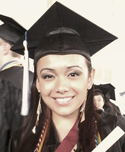Our Alumni
Karla Mendez
Political Science Major
Class of 2012
What made you decide to major in political science?
I stumbled into political science by accident. I chose to take Perspectives on Politics to fulfill one of my social science requirements and Dr. Alain Sanders, a professor of encyclopedic knowledge, happened to be teaching the introductory course. The multidimensional aspects of the course, which covered American government, international affairs, political theory and comparative politics, opened my eyes to the marvels of politics. I immediately knew that I wanted to major in political science and learn about the processes that go unnoticed by many people but actually affect everybody.
Which courses in the department were most significant for you?
Every political science course has shaped me into a more critical thinker. Dr. Anna Brown’s Seminar in Genocide introduced me to the political and social forces that can spawn racism and genocide. The course provided me with a broad and deep understanding of the Holocaust and the other genocides that have plagued human history, including the genocide of the Native American people. Equally important was Dr. Alexander Mirescu’s course on Government and Politics in Latin America. As a Latina student, I became conscious for the first time of the political elements that influenced the development of South American and Caribbean countries.
What were your most rewarding experiences in the department?
Being able to work alongside the most knowledgeable people I have ever met. I say “work alongside” because I have built a genuine rapport with each of my professors, and each has treated me with an individualized commitment to help me succeed. For example, Dr. Mirescu and I worked on two major projects together. One involved organizing preliminary research to analyze Eastern European anti-corruption measures and accountability in the public sector. As a research assistant, I learned valuable and transferrable skills that later helped me to develop my honors thesis, “The Effects of Corruption on the Democratization of Chile and Argentina: Rule of Law,” again under the tutelage of Dr. Mirescu.
Can you describe your interactions with the faculty of the department?
They were truly one of a kind. The political science professors are always willing to answer any and all questions. Office hours in the department are but an invitation to indulge in rich conversations with highly educated minds. Those conversations prompted and fueled my self-development.
What will you most remember about the political science department?
The fact that there was always someone to talk to – students and professors. I will never forget sitting around the large wooden table in our departmental living room and conversing about politics, course work, future employment and life. I made great friends among the political science students.
What was your greatest challenge in the department?
The completion of my 90-page honors thesis. I completed it while juggling 18 credits, working part-time and volunteering at the Jersey City Municipal Court. The thesis challenged me both physically and mentally. Dr. Mirescu, my advisor, kept me on track, helped me revise it, and coached me for my presentation. And so, my greatest challenge also became my greatest accomplishment. I learned to organize and manage my time, write like a scholar and speak in public.
What was the funniest thing that happened to you in the department?
Dr. Richard Thurston is an amazing professor and also a very comical person. He would often engage students in thought-provoking discussions by assigning titles to different students such as “cattle rancher,” “single mother on welfare,” “Republican candidate” or “Moroccan belly dancer” to illustrate a point. Students were often caught off-guard by the arbitrary assignment of their “profession” and the role-playing that was called for, which made everyone burst into laughter. One time, Dr. T even danced a bit!
What do you intend to do upon graduation?
I am honored and excited to be one of 12 national finalists selected to participate in the Congressional Hispanic Caucus Institute’s Fall 2012 Internship Program. I will be working in a congressional office during the heat of the 2012 election year. I plan to use this internship experience, and my Saint Peter’s education, to pursue graduate studies in political science and public affairs and ultimately to obtain a policy planning position with the federal government.
In what extra-curricular activities did you participate, and what did you learn from them?
For two years, I was the president of Females and Friends On Campus United in Solidarity (F.O.C.U.S.), a student organization committed to gender equality. As a result of my position, I was invited to present a workshop at the Hudson County Women’s Conference. My extra-curricular experience refined my management, event planning and collaboration skills.
How did Saint Peter’s University help form you?
The motto “Education. One Student at a Time” isn’t just a catchy phrase. It’s an encapsulation of the tailored educational support I received as an undergraduate at Saint Peter’s University. The richness of the curriculum, delivered by knowledgeable and supportive professors, and the constant encouragement to become involved and think outside of the box helped form my character and make me who I am today.

